How to Understand MVR Check Meaning
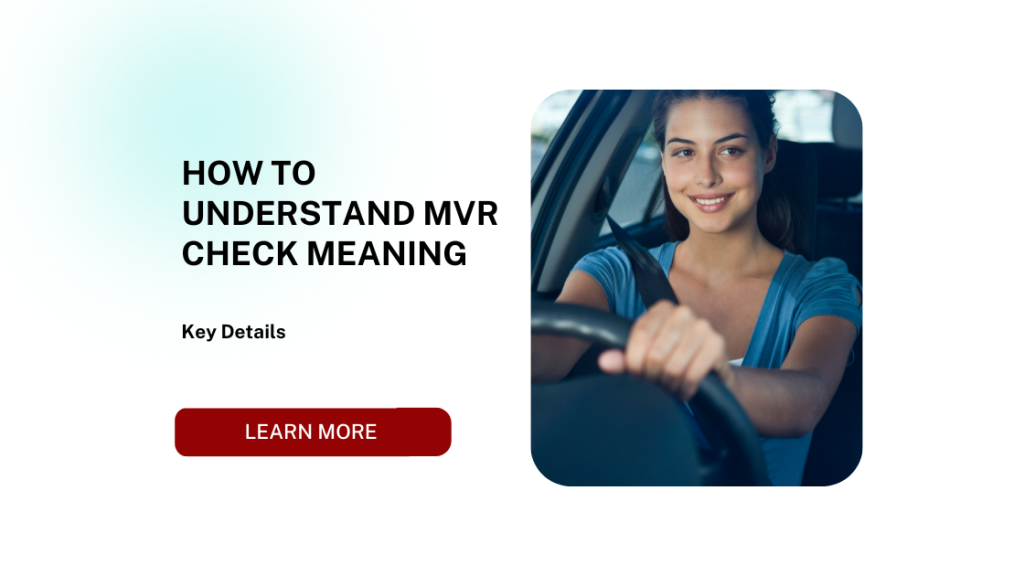
Introduction and Overview of MVR Checks
An MVR check (Motor Vehicle Record check) is a background screening process that examines an individual’s driving history. This check provides detailed information about a person’s driving behavior, including their driver’s license status, traffic violations, accidents, and other relevant driving data. MVR checks are used by employers, insurance companies, and government agencies to assess the risk and reliability of individuals who operate vehicles.
For businesses, MVR checks are essential when hiring employees for positions that require driving, such as delivery drivers, truck drivers, or rideshare operators. It helps employers make informed decisions, ensuring they select drivers who have a safe and responsible driving record.
The MVR check meaning refers to this process of reviewing and verifying an individual’s motor vehicle record to gather valuable information about their driving history, which is often crucial in high-risk roles involving transportation.
What Does MVR Stand For?
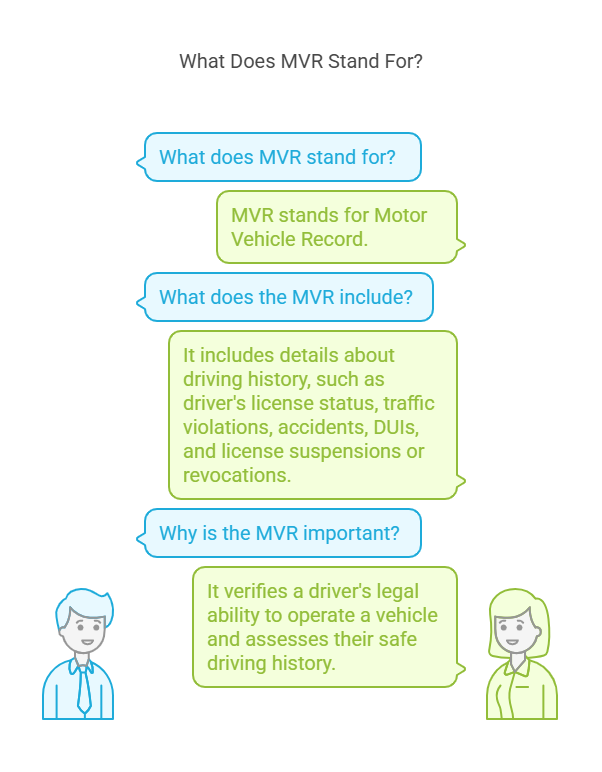
MVR stands for Motor Vehicle Record. It is an official document maintained by state or local government authorities (usually through the Department of Motor Vehicles, or DMV). The MVR includes details about an individual’s driving history, such as:
- Driver’s license status
- Traffic violations
- Accidents or collisions
- DUIs (Driving Under the Influence)
- License suspensions or revocations
The MVR serves as an important record to verify that a driver is legally allowed to operate a vehicle and to assess their history of safe driving. It is regularly used by employers, insurers, and even courts to evaluate a person’s driving behavior.
Why Are MVR Checks Important?
MVR checks play a significant role in various contexts, including employment, insurance, and legal matters. Below are some of the key reasons why MVR checks are essential:
- Employment: Employers, especially in industries such as trucking, delivery, rideshare, and logistics, rely on MVR checks to assess the suitability of candidates for driving-related roles. An individual’s driving history can highlight potential risks that could affect the safety and reliability of the workforce. A clean driving record is often a requirement for driving roles to ensure minimal risk to the company and its employees.
- Insurance: Insurance companies use MVR checks to determine a driver’s risk level when calculating premiums. Drivers with a history of violations, accidents, or DUIs may face higher insurance rates. Conversely, a clean MVR often leads to lower premiums for both personal and commercial policies.
- Legal Matters: MVR checks are also important for legal purposes. Government agencies may use them to determine eligibility for driving licenses or evaluate claims involving traffic-related accidents. Law enforcement agencies check MVRs to review a driver’s history when investigating incidents or legal matters.
In industries that require drivers to operate vehicles, maintaining a safe driving history is paramount. MVR checks are a critical tool for ensuring that only responsible and legally compliant individuals are entrusted with driving responsibilities.
What Information is Included in an MVR Check?
An MVR check gathers a comprehensive set of data that can be used to evaluate a driver’s history. Here are the key pieces of information that an MVR check typically includes:
- Driver’s License Status: The current status of the individual’s driver’s license—whether it is valid, expired, suspended, or revoked.
- Traffic Violations: Any tickets, citations, or moving violations the individual has received, such as speeding tickets, red-light violations, or reckless driving charges.
- Accidents: Information on any accidents the driver has been involved in, including whether they were at fault and the severity of the incident.
- DUIs or DWIs: Any Driving Under the Influence (DUI) or Driving While Intoxicated (DWI) offenses, which could significantly affect the individual’s driving qualifications.
- License Points: In some jurisdictions, points are assigned to a driver’s record for each violation or infraction. The MVR check will typically indicate how many points the driver has accumulated.
- Driving Restrictions: Any special conditions or restrictions placed on the driver’s license, such as needing corrective lenses or being restricted to driving certain types of vehicles.
This information allows employers and other stakeholders to understand a person’s overall driving behavior and assess potential risks, ensuring that only those with clean and responsible driving records are given driving responsibilities.
Why Do Employers, Insurance Companies, and Government Agencies Perform MVR Checks?
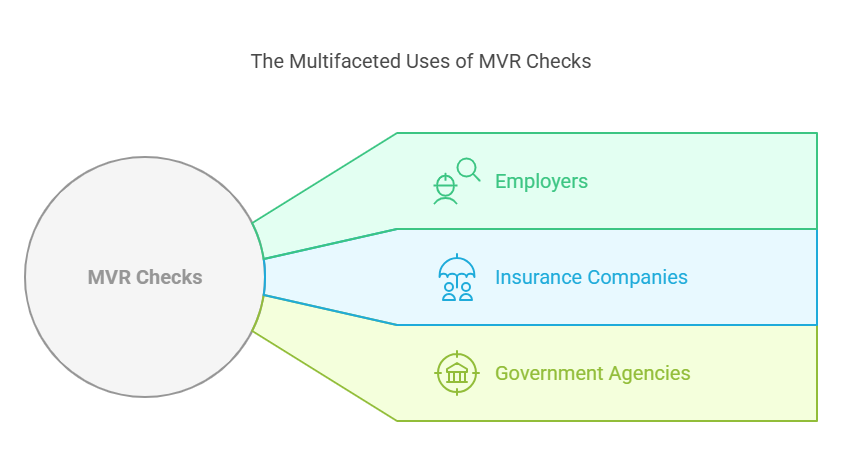
MVR checks are performed by various entities for specific reasons. Here’s how they are commonly utilized:
- Employers: For businesses in industries like trucking, delivery, and ridesharing, MVR checks are a critical part of the hiring process. Employers need to know if potential employees have a history of traffic violations, accidents, or DUIs, as these issues can pose a liability risk. By reviewing MVRs, companies can ensure that the individuals driving for their business are responsible and safe drivers, reducing the chance of accidents, claims, and insurance hikes.
- Insurance Companies: Insurance providers assess MVRs to determine the risk associated with insuring a driver. A clean record generally results in lower premiums, as the individual is considered less risky to insure. Conversely, a driver with multiple violations or accidents may be charged higher premiums or may even face difficulty in obtaining insurance coverage.
- Government Agencies: Government organizations often use MVR checks for regulatory purposes. For example, they may verify that an individual has the legal right to operate a vehicle, confirm compliance with traffic laws, or review driving history in the event of a traffic-related dispute. MVRs can also be used when determining eligibility for certain types of licenses or certifications.
By utilizing MVR checks, employers, insurers, and government bodies help ensure public safety, reduce liability, and make more informed decisions about the individuals they work with or insure.
The Process of Obtaining an MVR Check
An MVR check is typically obtained through state government agencies, such as the Department of Motor Vehicles (DMV) in the U.S. These agencies maintain records of all licensed drivers, and businesses or individuals can request MVR checks to verify a driver’s history.
Here’s how the MVR check process generally works:
- Requesting the MVR: To obtain an MVR check, the requester needs to submit a formal request to the appropriate state agency. Depending on the state, this may be done online, by mail, or in person. Some states may require the driver’s consent before releasing their driving record, while others may allow employers to access the record as part of a hiring process, as long as they comply with state and federal laws.
- Providing Required Information: To conduct the MVR check, specific information is required from the driver, including:
- Full name
- Date of birth
- Driver’s license number
- Social Security Number (optional in some cases)
- Processing Time: Once the request is made, it typically takes a few days to process an MVR check, although some states provide instant online access to driving records. Processing times may vary depending on the state’s system and the volume of requests.
- Reviewing the Results: After the MVR is obtained, the requester receives a report detailing the individual’s driving history. This may include information about the driver’s license status, violations, accidents, DUIs, and any other relevant data.
- Using the Information: The results of the MVR check are then used to make informed decisions about the individual’s suitability for a job, insurance policy, or driving-related responsibilities.
MVR checks are typically requested by employers, insurance companies, and government agencies to ensure that individuals with driving responsibilities maintain a clean and safe driving history.
How MVR Checks Are Used in Different Industries
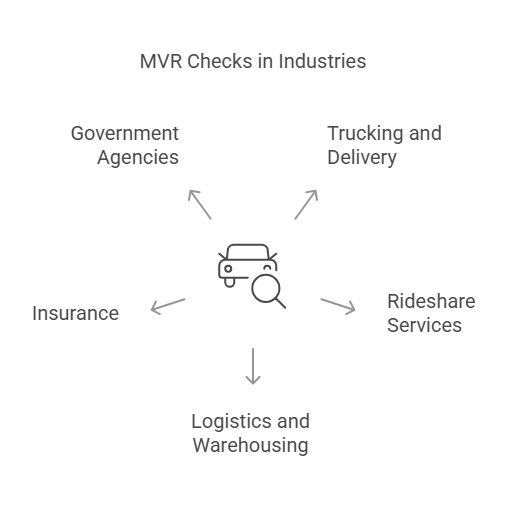
MVR checks are particularly important in industries that involve driving. Here are some common applications:
- Trucking and Delivery Services:
- For companies in the trucking or transportation industries, MVR checks are essential to assess the driving history of potential hires. This is especially important for long-haul drivers or those responsible for transporting goods over long distances. An MVR check helps identify risky drivers with a history of accidents, DUIs, or other violations that could pose a threat to the safety of the cargo, driver, or other motorists.
- Rideshare Services:
- Rideshare companies like Uber and Lyft rely on MVR checks to ensure that their drivers have a safe and responsible driving history. These checks are used to screen out drivers with problematic driving records, such as multiple traffic violations or DUIs, thus maintaining customer safety and trust in the platform.
- Logistics and Warehousing:
- Businesses that involve managing fleets of vehicles—whether for delivery, transportation, or maintenance—use MVR checks to ensure drivers are qualified and safe to operate vehicles. A driver’s record can help assess whether they are reliable enough for transporting goods, especially for roles that involve hazardous materials or heavy-duty trucks.
- Insurance:
- Insurance companies use MVR checks to assess the risk level of drivers before determining premium costs. Commercial vehicle insurance policies often rely on MVR checks to evaluate a fleet’s overall risk, determining if the drivers in a fleet have a history of accidents or violations that might increase liability.
- Government Agencies:
- MVR checks are used by various government bodies to ensure compliance with road safety regulations. For example, government agencies may perform MVR checks to determine if a person is eligible for a commercial driver’s license (CDL) or if a driver’s past history disqualifies them from certain driving-related roles, like operating a bus or transporting hazardous materials.
Precise Hire: A Provider of MVR Checks
Precise Hire is a trusted provider of MVR checks that offers accurate and compliant screening services to businesses and individuals. Their platform allows organizations to access reliable driving records quickly and efficiently. Precise Hire ensures that businesses comply with relevant laws and regulations while also providing comprehensive reports that highlight key details from an individual’s motor vehicle history.
Some of the benefits of using a professional service like Precise Hire for MVR checks include:
- Accuracy: Precise Hire sources data directly from state agencies, ensuring that the MVR checks are up-to-date and accurate.
- Compliance: They help ensure that the screening process complies with the Fair Credit Reporting Act (FCRA) and other relevant regulations.
- Efficiency: Precise Hire streamlines the MVR check process, making it faster and easier to get the information businesses need to make informed decisions.
- Customized Reports: Users can receive tailored reports that focus on the specific data relevant to their needs, such as traffic violations, accident history, or DUI records.
- Cost-Effectiveness: With affordable pricing, Precise Hire offers businesses an efficient and budget-friendly solution for managing their employee and fleet screening needs.
Types of MVR Checks and Their Features
MVR checks can vary based on the scope of the search and the state in which the check is conducted. Here’s a breakdown of the different types of MVR checks available:
| MVR Check Type | Description | Features | Use Case |
|---|---|---|---|
| State-Specific MVR | A check limited to a single state’s motor vehicle records. | Includes violations, accidents, suspensions, and driver status. | Best for businesses hiring drivers within a specific state or region. |
| National MVR Check | A comprehensive search across multiple states. | Covers driving records from all states the driver has been licensed in. | Ideal for companies with employees who may have lived or worked in multiple states. |
| Certified MVR Check | A verified record issued by the state. | Certified by the DMV, includes official status and history. | Commonly required for commercial drivers or regulatory compliance. |
| Driver History Report | A more detailed report, often including insurance claims and accident history. | Provides a deeper look into the individual’s entire driving history. | Used by insurers or companies in high-risk industries. |
These various MVR check types cater to the needs of different industries and help ensure businesses are conducting thorough evaluations before hiring drivers or insuring vehicles.
The Benefits of Using Professional MVR Check Services
While it’s possible to perform MVR checks independently through state agencies, using a professional service like Precise Hire provides numerous advantages:
- Time-Saving: Professional services can quickly retrieve MVRs without needing to navigate complex government websites or mail-in requests.
- Comprehensive Results: Services like Precise Hire provide more thorough reports than self-service checks, ensuring that no crucial information is missed.
- Compliance Support: Professional services help ensure the MVR check process adheres to legal regulations like the FCRA, reducing the risk of compliance violations.
By using a reliable service, businesses can make more informed decisions about their drivers, reducing risks and ensuring that employees have the right qualifications and history for their roles.
Legal Aspects of MVR Checks
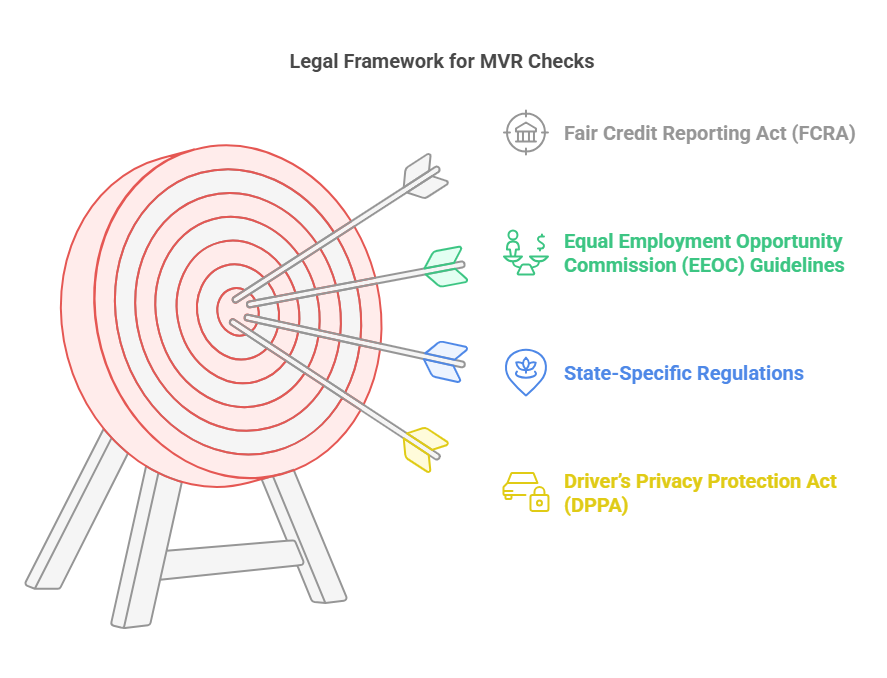
When conducting MVR checks, it’s crucial to understand the legal framework that governs how driving records are accessed, used, and shared. There are several key regulations that businesses must follow to ensure compliance with federal and state laws:
- Fair Credit Reporting Act (FCRA):
- The FCRA is a federal law that governs how consumer information, including driving records, can be used in employment and insurance decisions. According to the FCRA, employers must obtain written consent from a driver before accessing their MVR. Additionally, employers must ensure that the information is used for a valid purpose (e.g., employment or insurance) and that it does not lead to discrimination based on protected classes.
- If an employer decides not to hire an applicant based on the information in an MVR check, they must provide the applicant with a notice explaining the decision. This is often referred to as an “adverse action notice.”
- Equal Employment Opportunity Commission (EEOC) Guidelines:
- The EEOC provides guidelines to employers on using criminal background and MVR checks to avoid discriminatory practices. For example, the EEOC recommends that employers not automatically disqualify applicants based solely on past violations that are not related to the job requirements. The guidelines stress the importance of considering the nature and relevance of violations in relation to the position for which the candidate is being considered.
- State-Specific Regulations:
- Different states may have their own laws regarding the use of MVR checks, especially concerning the types of records that can be accessed and the scope of information disclosed. For example, some states may limit access to certain violations or restrict how far back an MVR check can go (e.g., only checking the last 3 or 7 years). It’s essential for businesses to understand their state’s specific regulations to ensure compliance when conducting MVR checks.
- Driver’s Privacy Protection Act (DPPA):
- The DPPA is a law that limits the use and disclosure of personal information obtained from motor vehicle records. It restricts access to driving records for purposes unrelated to lawful business activities, such as marketing or solicitation. Businesses must ensure they are accessing MVRs only for permissible purposes under the DPPA.
FAQs About MVR Checks
Here are some common questions regarding MVR checks, with detailed answers to help clarify their meaning, scope, and application:
What Information Does an MVR Check Reveal?
-
- An MVR check reveals information related to a person’s driving history, including:
- Driver’s license status (valid, suspended, expired)
- Traffic violations (speeding tickets, running red lights, etc.)
- Accidents (reported accidents and their severity)
- DUI or DWI convictions
- License suspensions or revocations
- Points accumulated on the driver’s record
- An MVR check reveals information related to a person’s driving history, including:
How Far Back Does an MVR Check Go?
-
- The time period covered by an MVR check depends on state laws and the type of check requested. Typically, MVR checks may go back 3 to 7 years, but some states may provide records for a longer period. For example, commercial driver records may be more extensive, reflecting a history of violations over many years.
Can an Employer Refuse to Hire Based on an MVR Check?
-
- Yes, employers can refuse to hire a candidate based on the results of an MVR check, particularly if the candidate has a history of severe violations (e.g., DUIs, reckless driving) or accidents that pose a safety risk. However, employers must ensure that their decision is based on valid, job-related reasons and is not discriminatory in nature.
How Often Should MVR Checks Be Updated?
-
- MVR checks should ideally be updated at least once a year for employees who regularly drive as part of their job. For example, commercial truck drivers or delivery drivers may have their records updated more frequently. For new hires, an MVR check should be conducted as part of the pre-employment screening process to ensure that drivers have a clean and safe history.
What Happens If I Fail an MVR Check?
-
- Failing an MVR check can lead to several consequences, depending on the severity of the violations. For employers, this may result in not hiring the individual or terminating their employment if they’re already employed. For drivers, a failed MVR check could lead to higher insurance premiums or, in severe cases, a loss of driving privileges. Drivers may also be required to attend traffic safety courses or complete certain conditions before their driving record is considered acceptable for certain jobs or activities.
Conclusion
In this article, we’ve explored the MVR check meaning, the process of obtaining and using MVR checks, and the legal aspects that businesses and individuals must consider when using driving record information. MVR checks are crucial for industries that rely on driving, such as trucking, delivery, and ridesharing, as they help ensure safety, compliance, and reliability.
We’ve also discussed how Precise Hire provides reliable MVR check services that assist businesses in making informed decisions while adhering to legal requirements. Whether you’re hiring drivers, managing a fleet, or assessing insurance risk, MVR checks are an essential tool for ensuring safety and compliance.
By using a trusted provider like Precise Hire, businesses can access accurate and up-to-date driving records, helping them protect their employees, customers, and reputation while maintaining a safe and reliable workforce.
